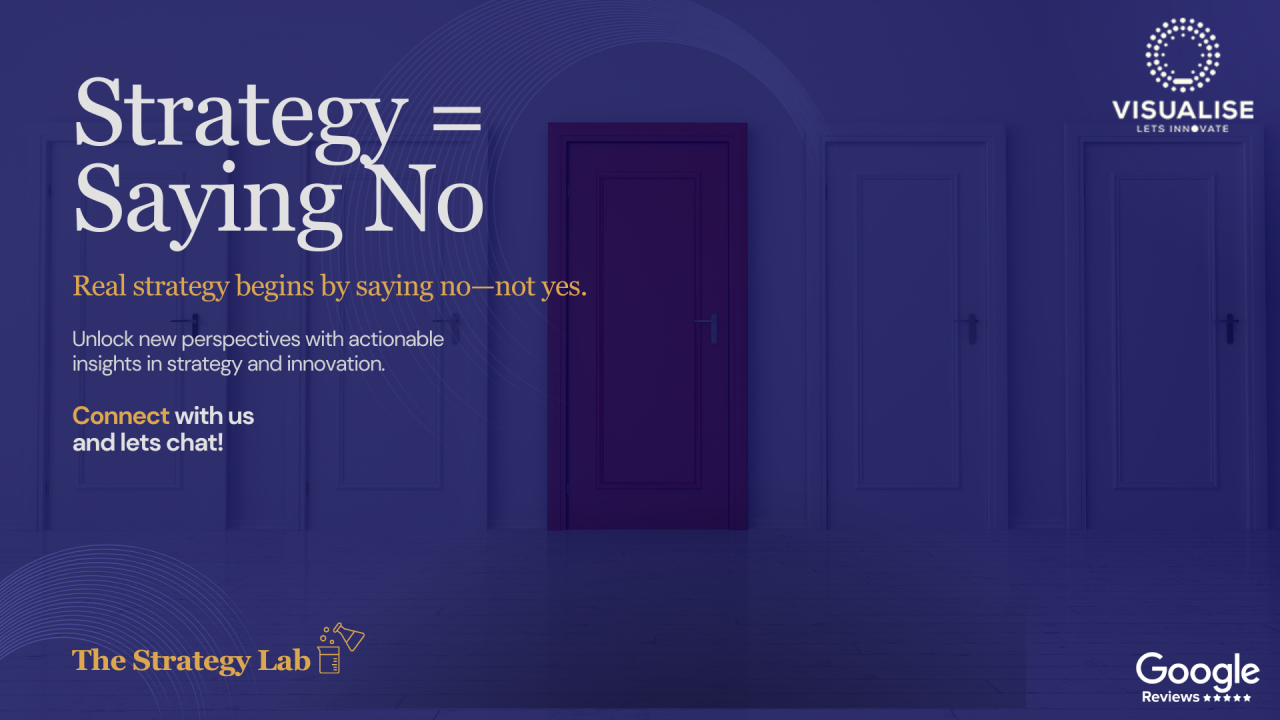Apr13

In business, saying yes is often celebrated. It feels like progress—more projects, more markets, more opportunities. But real strategy doesn't start with saying yes. It starts with saying no.
This idea echoes a truth famously voiced by Steve Jobs:
“Focusing is hard because it doesn't mean saying yes, it means saying no.”
That sentiment is more than philosophical. It’s deeply strategic. Michael Porter, through the lens of Joan Magretta’s Understanding Michael Porter, articulated this with precision:
“The essence of strategy is choosing what not to do.”Why Saying No Matters
Strategy is not about doing more. It is not a checklist of initiatives or a wide net cast to capture every opportunity. It is about making hard, deliberate trade-offs—deciding, with intention, what your organization will not do.
Without trade-offs:
- You dilute focus and stretch resources.
- You lose any distinctive positioning.
- You begin to look, act, and feel like your competitors.
Magretta describes trade-offs as the “linchpin” of strategy. They serve as the guardrails that prevent what she calls competitive convergence, where companies imitate one another to the point that no one stands out. In this environment, differentiation disappears, margins erode, and growth becomes a zero-sum game.
Strategy Is the Art of Subtraction
It’s tempting to believe that strategy is about finding ways to do more with less. But the more profound truth is this: strategy is subtraction. It’s the disciplined removal of distractions in service of clarity.
This aligns with Roger Martin and A.G. Lafley’s perspective in Playing to Win: How Strategy Really Works. They argue that strategy is a set of interdependent choices about:
- What is our winning aspiration?
- Where will we play?
- How will we win?
- What capabilities must we build?
- What systems are needed to support those capabilities?
Each choice is a declaration of intent—and each one excludes alternatives. Choosing where to play, for instance, means deciding where not to play. It’s a narrowing of focus that increases coherence and heightens the chance of success.
Focus Isn’t a Lack of Ambition
Some organizations hesitate to make trade-offs out of fear: fear of missing out, shrinking potential markets, and closing doors. But in avoiding commitment, they fall into the trap of diffusion. Without a tight focus, even the most talented teams struggle to execute.
Focus is not the enemy of growth. It is its engine. Concentrating effort on a clear strategic path enables deep capability building, better resource allocation, and a sharper value proposition.
Leaders must recognize that in strategy, breadth often undermines depth. The most enduring companies win not by trying to be everything to everyone but by being exceptionally valuable to a well-defined segment. Focus, then, is not a constraint—it is a competitive advantage.
The Courage to Commit
What makes strategic choice difficult is the psychological cost of closing doors. In an age that prizes agility and optionality, committing to one path feels risky. But the greater risk lies in trying to keep all options open.
As Martin and Lafley emphasize, strategy is not a static plan—it’s a dynamic hypothesis about how to win. While the environment may change, the need for clear, bold choices remains constant.
Companies that succeed are those that:
- Make choices decisively.
- Say no to initiatives that don't align with their strategic intent.
- Protect their positioning through discipline, not just creativity.
Choosing Is Leading
Ultimately, the act of choosing is what separates strategic leadership from operational management. Managers optimize the known. Leaders chart the unknown. They take a stand, commit to a direction, and bring others with them.
This is not a one-time exercise. Strategy demands continuous recommitment. It requires saying no repeatedly to distractions, temptations, and short-term wins that pull the organization away from its long-term path.
As Jobs embodied and Porter codified, focus is not about doing fewer things for their own sake. It’s about doing fewer things better—with intention, coherence, and the courage to stand apart.
Final Thought
Strategy is not about being busy. It’s about being right. It’s the courage to subtract, the discipline to focus, and the wisdom to know that in the long run, less truly is more.
For leaders looking to sharpen their strategic edge, the question isn’t, “What else can we do?” It’s, “What are we willing to stop doing?”
That’s where strategy truly begins.
Further Reading & Strategy Tools For business leaders seeking practical tools to strengthen focus, develop positioning, and avoid competitive convergence, explore Visualise Solutions, a hub for expert-led strategy development and consulting services.
By Andrew Constable MBA, XPP, BSMP
Keywords: Business Strategy, Innovation, Leadership
 Lateral Moves: The Most Overlooked Succession Strategy in Companies
Lateral Moves: The Most Overlooked Succession Strategy in Companies The Asset Play: Timing, Structure & Global Arbitrage
The Asset Play: Timing, Structure & Global Arbitrage  The Orchestra Needs a Conductor: Why Multi-Model Agents Require H2E Governance
The Orchestra Needs a Conductor: Why Multi-Model Agents Require H2E Governance The Role of Memory in Modern-day Business
The Role of Memory in Modern-day Business The Architectures of Permanence: A Comparative Analysis of the "Big Three" AI Strategies (2026)
The Architectures of Permanence: A Comparative Analysis of the "Big Three" AI Strategies (2026)